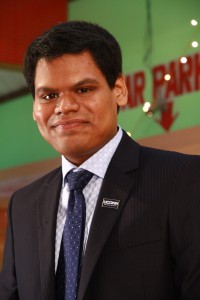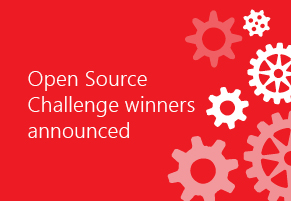This dude won the Microsoft Open Source Challenge, and you didn't
 The future of computing is open source -- the writing is on the wall. Major companies like Apple, Microsoft, and Google are embracing this software ideology, and more and more consumers are expecting it.
The future of computing is open source -- the writing is on the wall. Major companies like Apple, Microsoft, and Google are embracing this software ideology, and more and more consumers are expecting it.
Of course, for open source to continue its ascent, we will need students to be knowledgeable about it. Microsoft had this in mind when it announced its Open Source Challenge for students, and now we have four official winners. The top champion is a dude named Akond Rahman -- yeah, that is his smiling face to the right -- and he is now $5,000 richer. Better than the money, he has ultimate bragging rights in the open source community. Jealous?
"We're excited to announce that Akond Rahman, a second-year student in the computer science doctoral program at North Carolina State University, has won the Grand Prize in the first Microsoft Open Source Challenge. In his winning submission, Akond makes use of the Send2Vec, which are the predictors and trained model files of DSSM (deep structured semantic model or deep semantic similarity model) to quantify the semantic similarity of software projects", says Judith Bishop, Director of Computer Science, Microsoft Research.
Bishop further says, "The Open Source Challenge did exactly what we'd hoped: the winning students — some of whom hadn’t known about the offerings available through the Open Source for Academics program at Microsoft -- found the tools they needed to solve real problems. Their takeaway from the experience -- in addition to the prizes and, we hope, the greatly-deserved awe of their colleagues -- is that they have a new source for tools to help them with future projects, solving future problems. Others -- many of whom were already using Microsoft Research open source -- seized the opportunity to put their work in front of the people who appreciate it most".

Bishop shares the following three runner-ups (who each received $2,500) and their associated submissions.
- Varun Agrawal (Georgia Tech), for "OneGroup—Automated Photo Sharing via Facial Recognition", which uses Microsoft Cognitive Services (formerly Project Oxford) to create an automated photo-sharing feature that integrates Microsoft OneDrive and the Outlook Contacts API. It optimizes sharing flows for customers by answering the question 'how do I share more easily?'
- Saeid TizPas Niari (University of Colorado-Boulder), for "CONfidentiality CERTifier, a Modeling and Verification Framework for Program Confidentiality", which extracts a nondeterministic transducer abstraction from programs and uses transducer techniques for analysis. A prototype tool was built around the Z3 theorem prover.
- Yida Wang (Beijing University of Posts and Telecommunications) for "CNTK on Mac: 2D Object Restoration and Recognition Based on 3D Model", which synthesizes and renders 2D images with and without background, and uses the Computational Network Toolkit (CNTK) to train a segmentation and restoration model to restore the foreground image. CNTK’s open source was changed to support CNTK on Mac for object recognition based on 3D object or normal photos.
While all four students deserve major congratulations, I am a tad disappointed that none of the winners are women. With that said, this does not mean Microsoft excluded anyone -- there could have been female participants that entered submissions, but simply didn't win. In other words, not everything is a controversy, y'all.
Ultimately, Microsoft did a nice thing for both the open source community and higher education overall. The $12,500 in prizes is just icing on the cake.